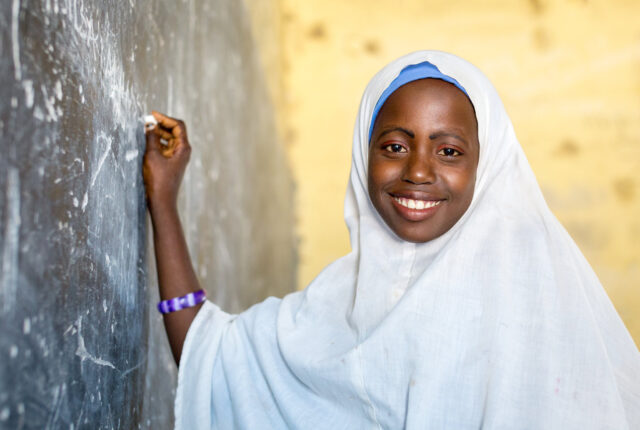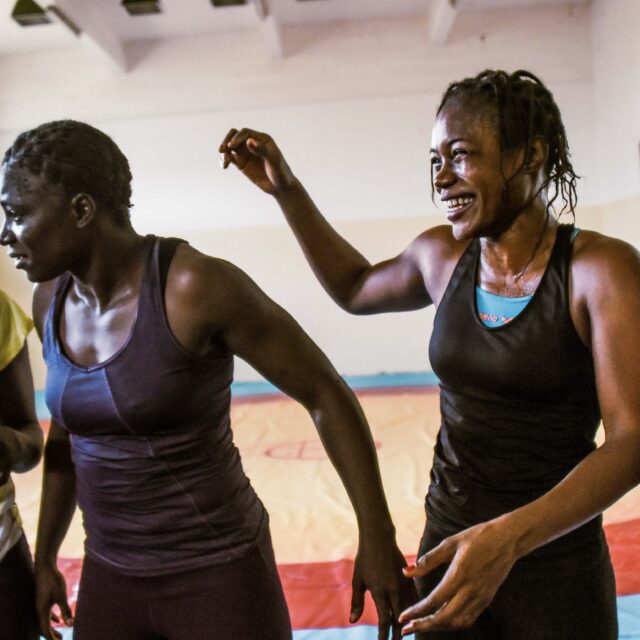Maryjacob Okwuosa, Mukhtar H. Modibbo are Youth Leaders for Global Partnership for Education. They raise awareness of the barriers to education and aim to increase the ambition of leaders for financing education and development.
The impact of COVID in Nigeria
The advent of the COVID pandemic has not only revealed the poor state of infrastructure and facilities in the health sector of Nigeria but also revealed the reality of the dilapidation and poor funding of the education sector. Aside from the health sector, no other area has suffered the impact of COVID-19 like education.
While many countries have easily adapted and switched to virtual classes, in Nigeria, it is not only difficult but also impossible to open our schools virtually due to lack of facilities necessary to operate virtual classes, poor provision of the internet network, unstable power supply, high cost of mobile data and other challenges. Many children were out of school even before the pandemic, and even more, have dropped out due to the pandemic.
The learn from home teaching method introduced by the Nigerian ministry of education to teach through radio and television is not yielding the desired result as the electricity supply in the nation is below average and the majority of Nigerians are living below the poverty line and cannot afford televisions or radios.
Education financing in Nigeria
The need to protect education budgets has never been more urgent. Records show that for the past ten years the Nigerian education sector allocation has not reached the UNESCO recommended 10 to 15% of the budget in developing countries. This has led to teacher strikes at all levels of education in Nigeria, with other calamities that have reduced the once-proud education sector into a complete laughing stock in international education rating standards.
In Nigeria, basic education is financed through concurrent financing from the three tiers of government—Federal, State, and Local Government Authority, with distinct financing mandates and responsibilities for each tier. The federal government provides 50% and the state and local government as 30% and 20% respectively.
As a result, state investment in education is heavily reliant on the federal account allocation, making its educational goals susceptible to challenges of national resource mobilization (COVID-19, international oil price fluctuation) and expenditure management.
The federal government of Nigeria allocated the sum of 568 billion naira (approx. USD 1.5 billion) to education in 2020. However, as a result of COVID, this allocation was reduced to 509 billion naira (approx. USD 1.34 billion). This has pressured public schools into dismissing hundreds of temporary staff members and skyrocketed student school fees in various institutions, thereby increasing the inequality in education.
In addition, the attacks on education facilities in Northeast Nigeria have destroyed infrastructure worth billions of naira and resulted in the deaths of countless students and teachers. This destruction requires funding to rebuild and to employ more teachers, as well as strengthen the security to assure the safety of teachers and learners.
Debt
As of March 31, 2020, Nigeria’s debt was at 28.6 trillion naira (USD 79.3 billion). As the country addresses this debt burden, funding to social sectors, especially education, is likely to pay the price. Lack of support for education will affect wider development issues including health, poverty, and economic growth, as well as the empowerment of women and young people. This will thereby have a lasting impact on the nation’s economy, safety, literacy, and equality.
Education provides the platform to improve the quality of life and continuous regeneration of knowledge, capacity, and skill in the society for continuous productivity and development.
Recommendations
Now is the time for education leaders to step up their investment in education and increase enrollment to schools, especially for girls. All stakeholders must double their efforts to sustain the recorded achievement and contribute to the realization of SDG 4.
As COVID strains national economies and budgets, we need to protect domestic education budgets and ensure that education remains a priority for national governments. Governments must also be held accountable for education expenditure, CSOs and citizens play an important role here to track expenditure and make sure that every dollar that is allocated for students reaches its intended destination.
To increase enrollment and improve the security of students, we must ensure adequate financing for education and protect education budgets during the COVID-19 pandemic and beyond.
Education must be accessible to all without any form of discrimination.
Sign our petition and tell governments to invest in every child’s future.
*Image is of Nasiba Alhassan, at Miga Central Primary School, Miga, Jigawa State, Nigeria. Credit: GPE/Kelley Lynch



